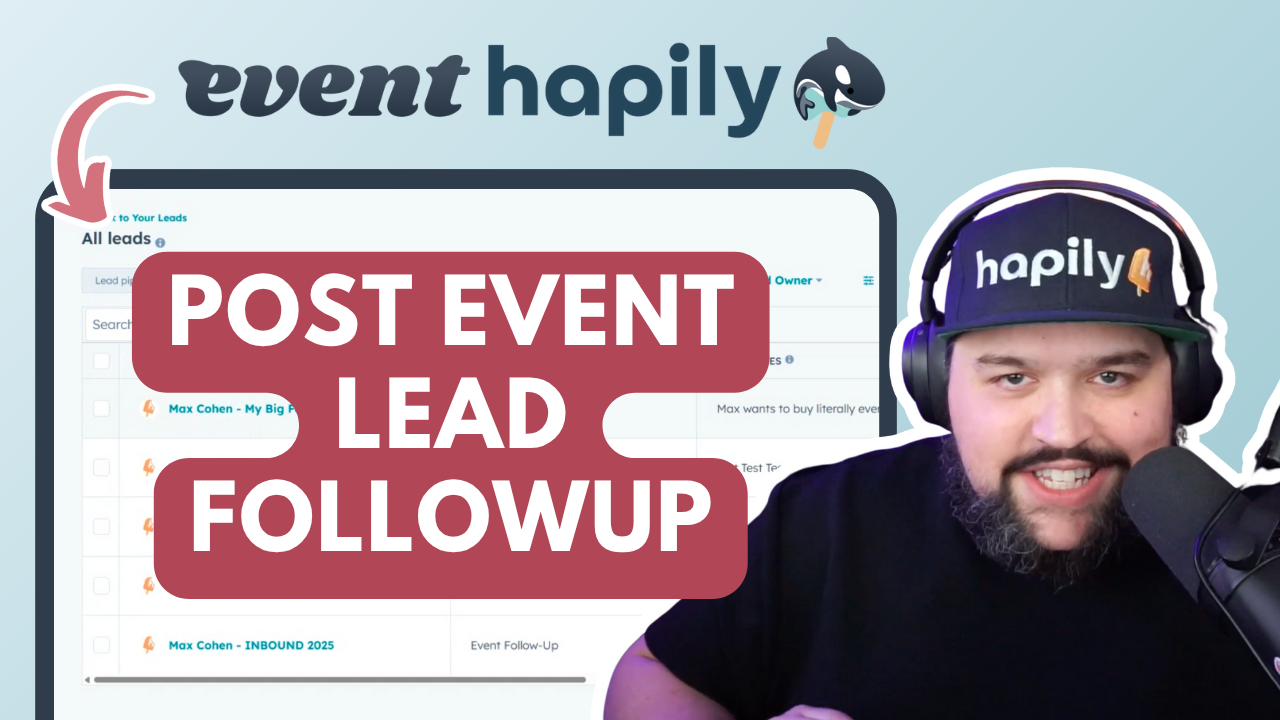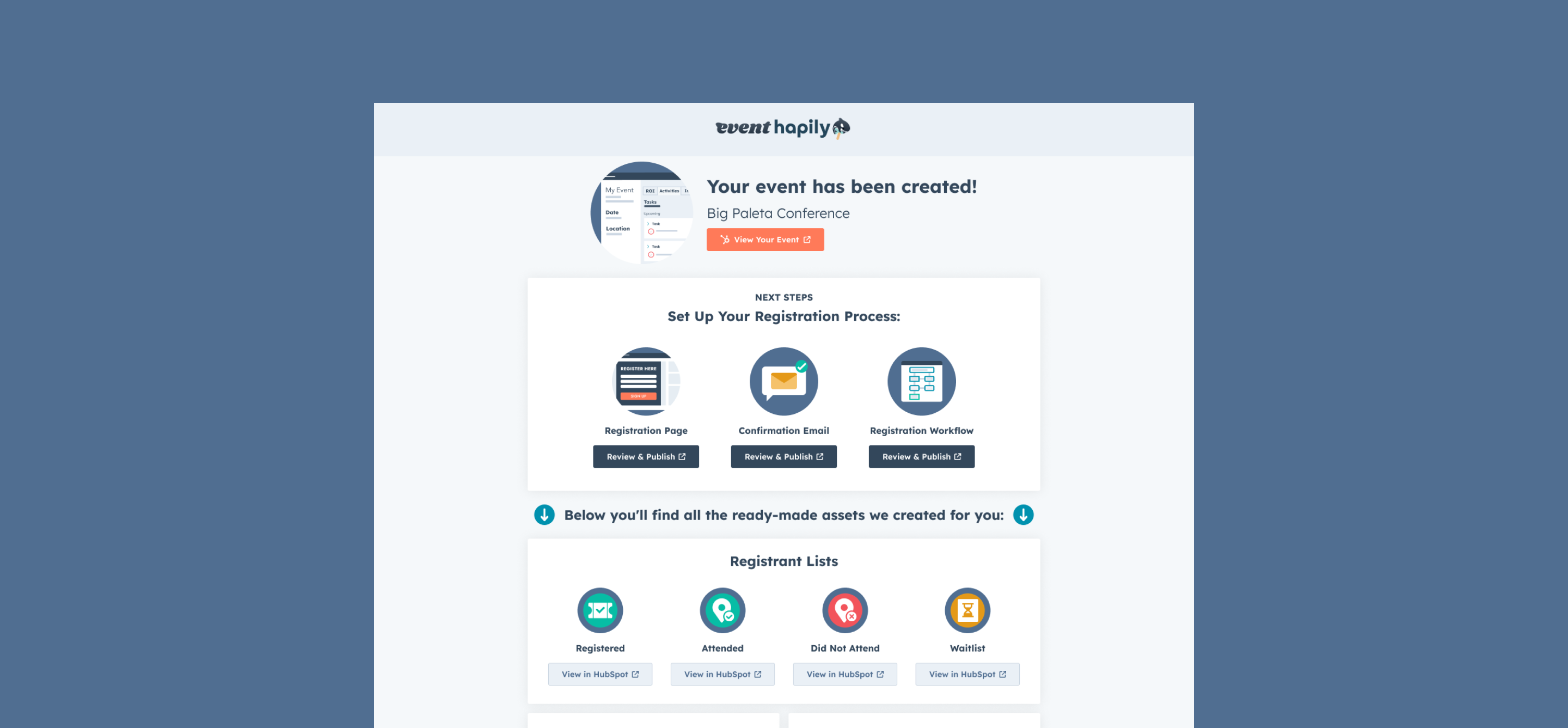If you’ve ever wrapped up an event and realized your team’s post-event follow-up plan consisted of “We’ll get to it next week…” — this one’s for you.
Because let’s be real: after all the booth prep, travel, and marathon days on the show floor , the last thing you want is for warm leads to go cold because your follow-up process didn’t keep up.
Enter event•hapily — your HubSpot-native secret weapon for ensuring no attendee, lead, or conversation slips through the cracks.
Why Post-Event Follow-Up Matters More Than Ever
Whether you’re hosting your own lunch and learn or running a booth at a trade show, events are where real connections happen. But connections only turn into customers when your team actually follows up — quickly, contextually, and with the right message.
And that’s where too many teams drop the ball. Disconnected systems. Manual imports. Spreadsheets that haunt your dreams.
With event•hapily, post-event follow-up becomes just another seamless part of your HubSpot process — automated, tracked, and easy to scale.
Scenario 1: When You’re the Host
Let’s say you’re hosting your annual Paleta Pickleball Tournament (because why not make business events fun?).
Everyone registers through a HubSpot form. event•hapily automatically creates a registrant record — tying every attendee’s info, event details, and attendance status back to their contact record.
Once the event wraps, you can trigger a simple HubSpot workflow that:
- Runs one day after the event ends.
- Checks for registrants marked as “Attended.”
- Automatically creates follow-up tasks for their contact owners.
Boom. Everyone who showed up gets a personalized follow-up, assigned to the right rep, without you lifting a finger.
Scenario 2: When You’re the Attendee
Now, not every event is your event — sometimes you’re the one on the show floor, badge-scanning like a champ and chatting with potential customers faster than your feet can recover.
That’s where event•hapily’s Lead object automation shines.
When you meet someone at a conference or scan their badge, event•hapily automatically associates that contact with the event as an Event Lead. From there, you’ve got two easy options:
- Create a Lead record in HubSpot’s Sales Workspace (formerly Prospecting Workspace)
- The lead is automatically named with both the contact and event, so you always know where that relationship started.
- It’s tagged with the lead type “Event Follow-Up.”
Notes from the conversation (yep — those quick snippets you jotted on-site or captured via form) flow directly into the record, so sales has full context for a smarter, faster follow-up.
Or, if your team doesn’t use Lead records, simply set your workflow to rotate contacts and create follow-up tasks — just like you would for a hosted event.
Either way, you’ve got a structured system that ensures every interaction you had on-site gets its moment of attention back in HubSpot — without you manually chasing spreadsheets or post-show lists.
Turning Post-Event Follow-Up into a Habit
Whether you’re hosting, sponsoring, or attending, the goal is the same: don’t let good conversations die in bad systems.
By centralizing attendee and lead data directly inside HubSpot, event•hapily gives you:
- Full visibility into who attended what, and when.
- Automated workflows that assign tasks or leads immediately after an event.
- A consistent, repeatable process you can scale across your entire event strategy.
Because let’s be honest — after spending days planning, traveling, and working your booth magic, you deserve more than a follow-up process that depends on someone remembering to “send a few emails later.”
event•hapily makes sure every attendee gets the right follow-up, every time. No missed connections. No cold leads. Just smarter, connected event management — all inside HubSpot.
Why It Matters
Follow-up isn’t just about checking a box — it’s about proving the ROI of every event you run or attend. With event•hapily, your post-event process becomes a direct line between the conversations that happen in real life and the deals that close in HubSpot.
From automated task creation to real-time attribution, you’ll finally see the full picture of what your events deliver.



![[ON-DEMAND WEBINAR] The ELG Advantage: Using Partner Data to Supercharge Your Event Strategy with Crossbeam, HubSpot, and hapily](https://event.hapily.com/hubfs/24-4.png)

.png)